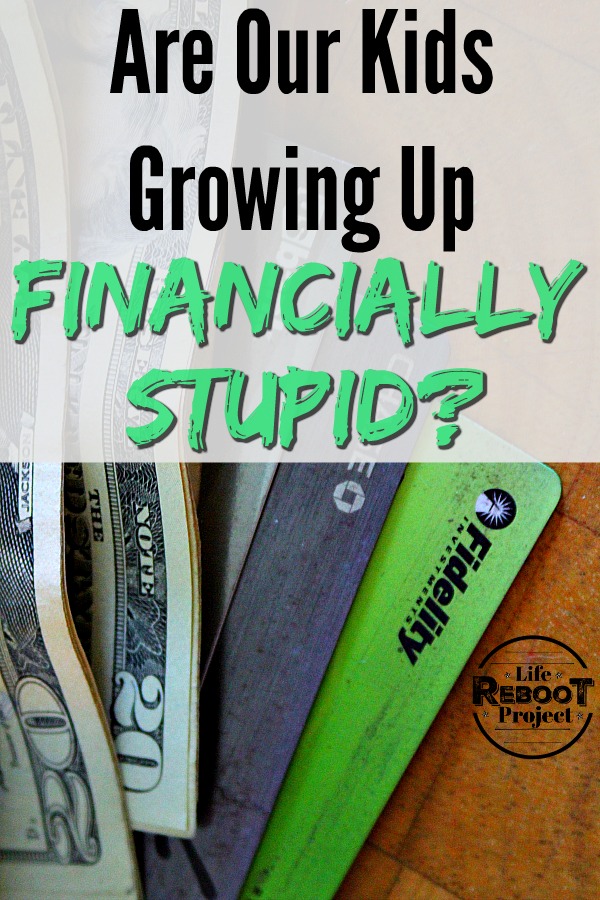
Are our kids growing up personal finance stupid?
And, if so, who is to blame?
Society; actually.
Student loan debt, credit card debt, inflated housing prices, who is actually to blame?
Everyone.
We are living in a world where large amounts of debt aren’t even viewed as a problem anymore.
I grew up in a typical American household in the seventies and eighties. Well, I think it was quite average.
We never discussed money at the dinner table.
We never really discussed money at all.
There was the usual talk at birthdays and Christmas to save the cash we got.
We all had savings accounts as kids, but outside of the usual comments to save our money, we never discussed money.
Yes, I grew up a financial idiot. The best I could do was to follow what I saw my parents doing without any discussion.
I wish they would have taught me more.
We endured a couple of layoffs through the eighties during the downsizing era.
And, from my point of view, our lifestyle was never phased.
My parents were pretty good with money.
We lived a relatively frugal lifestyle looking back on it now.
When you’re brought up around it, and your friends appear to be about the same, you never give it a second thought.
In my early twenties, I got trapped in some credit card debt.
When you run around with friends who like to spend on credit, peer pressure can get the best of you.
Without good training at a young age, I lived like I thought was right.
Personal finance for kids needs to start in the home.
The home is where the money talks need to start at a young age. And I’m not just talking about the usual clamor of saving your money. I mean full meetings about spending less than you earn.
We sat down talking about the dangers of debt.
Setup the 20% savings rule at a young age with an allowance.
We were always taught told to save, but then in the next breath, we were told our money was ours to do with it as we pleased.
We never saw the family budget.
But, what would be so wrong with teaching our kids precisely the numbers that made the household operate?
I think it boils down to vulnerability.
Parents want to be looked at as always having ‘it together’ and being in control.
Putting the family finances out on the table opens a side of vulnerability most parents are not willing to do.
But, I believe, the parents who are willing to put themselves out there will elevate the level of maturity of their kids.
Let’s look at it this way.
If the kids are privy to the finances of the adult, would they feel more connected as a family unit?
Is not educating about finances early in life possibly adding to some of the other disconnects between parents and children?
Maybe, the control struggle between parents and teens can be traced to a lack of trust between the parents and kids at an early age. Even to discussions about money.
Opening up a good dialog about money with kids at an early age could prevent not only financial irresponsibility leading into adult life but also bring the family closer together.
Teach personal finance in schools.
The second personal finance for kids needs to take place is in the schools.
I realize there are some problems with creating an excellent curriculum with this because of all the differences in opinion.
But, I think there are some core ideas we need to teach in our schools.
Core ideas like living below your means.
Saving a portion of your income first.
How to build an emergency fund.
And even the basic workings of investment.
Maybe even through some talk of multiple income streams and passive income.
I never became fully aware of the power of passive income streams until I read ‘Rich Dad Poor Dad’ when it came out in the late nineties.
School taught us the power of compound interest, but no one ever dangled the carrot of possible early retirement in front of us.
They taught us we were going to work until at least 65 and to a 15 or 16-year-old that seemed too far away even to start worrying about now.
Had someone in school started running through the numbers on how it would be possible to retire by 30, we probably wouldn’t have the debt problem we do now.
And, there would be many more people retiring by 30 or 40.
I link personal finance issues to how society thinks.
I might not make too many friends with this next statement, but I will just through it out there.
We are all responsible for the debt problem in the US because I believe it’s directly linked to the financial education we got and we are giving our kids now.
If there was never a good financial education growing up, how can we be so naive to think our country will be run with any fiscal responsibility?
We were all taught at a young age that spending is good. Spending moves the economy in the right direction.
Society teaches us if we can’t afford college, go and apply for student loans. Higher education has become a corporate money-making machine willing to do creative financing to get kids in the door.
Auto loans are freely tossed around to move the inventory of cars which will depreciate faster than the money owed on them.
The term commonly thrown around in these situations is people are ‘upside down’ in their car. This means they owe more than the car is worth. This is the case more often than not.
I did tell you I married into a used car business family, right?
And all these problems could have been prevented at an early age by a little education.
I’m sorry for the shock and awe, and the finger-pointing at the beginning of this section. There are some parents and teachers in the educational system that I’m sure are trying hard to do right.
But, unfortunately, it is not enough.
Personal debt keeps rising. The middle class is shrinking. And I believe much of it comes from a lack of financial education at a young age.
Maybe our kids understand personal finance more than we realize.
Like I said in a previous section, we never discussed our household finances. I had to learn on my own much of what I know about money.
But, here is one aspect that leads me to believe maybe kids now understand it better than we think. There are more people now retiring early and designing the life they want to live.
When I was in my twenties, I might have heard of one person here or there retiring early.
We thought of these as anomaly cases. Stuff you might read on the back page of the newspaper or articles back when blogging was young.
Now, retiring young is a massive movement. People all over the world are engaged in frugal living, investing, personal business building, or side hustling their way to creating a good life for themselves.
Millennials have been called lazy or unmotivated. Yet, this is the generation leading such movements as being a digital nomad, retiring early, or creating these monumental businesses and selling them for millions.
Maybe they are the most adapted to technology which makes these businesses possible. Maybe.
Just maybe, they understand money better than many of us elders who try to preach from lifelong experience.
Maybe, my generation is the stupid one, and just so happens we’re in charge now.
I’m also not naïve enough to think this one article will change anything. In fact, it will probably pretty much fall on deaf ears and get swept into the abyss of the web.
Plus, there is not much more here which hasn’t been said before.
We need to start the financial education of our kids early in life to have a possibility of it taking hold a making a change in a year or even generations to come. If our kids are smarter than we are, maybe it’s us which needs to look at what they are doing to live a more stress-free fuller life.
Till next time, be safe.
Kevin

